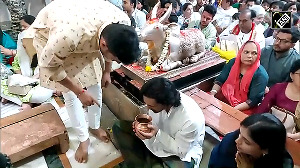It is fairly common to find hospitals advertising themselves through hoardings in the city through surrogate advertisements. The healthcare market is turning very competitive and many more hospitals are sitting on the sidelines to join the bandwagon.
The growing health consciousness, affordability factor, double-income families and medical insurance cover are expanding the healthcare market. There is no dearth of hospitals wanting to cash in on the opportunity. There are some others too waiting to jump in.
"There is space for everyone" is the refrain from those running these hospitals. The demand for high-end healthcare is only "taking off" is the argument and all expect the demand to shoot up. But, no one is ready to accept that they are fighting for patients.
"There are restrictions on advertising any medical facility and we at Columbia Asia adhere to the guidelines as circulated by the Medical Council of India. This way we ensure that we maintain ethical and legal standards of providing information on our services and facilities," says Dr Nandakumar Jairam, chairman and group medical director, Columbia Asia.
Every hospital has its own strategy to face the growing competition. Columbia Asia claims it highlights its offerings by focussing on medical care, insisting on quality assurance through medical audit, offering customer value for money for the medical facilities and work on the ambience and infrastructure.
Other hospitals do use the media and other options of mass communication for advertising to provide information. One way of marketing itself, in the case of a hospital, is by "patient experience", which is what Manipal Hospital claims to do and by other methods that ensure that they are not on the wrong side.
"Continuing medical education programmes are advertisements for us," says R Basil, MD and CEO, Manipal Health Systems. Standardisation of pleasant patient experience is the key, he adds. The hospital has launched loyalty programmes to add value, personalised care and "standardisation of pleasant patient experience".
"Some of the hospitals are showcasing cutting edge technology or specialised clinics to attract patients who need such care," says Dr Bhujang Shetty, medical director, Narayana Nethralaya. Medical centres should limit their advertising to services that have "a likelihood of improving the public health", he adds.
It's not ethical to overstep the bounds of patient trust by advertising services of questionable benefit and using fear to attract patients. Hospitals should "think about how they advertise, really avoid scaring people, exaggerating benefits or creating false hopes", feels Dr Shetty.
Lloyd Nazareth, head, Wockhardt Hospitals-Bangalore, adds, "We tell people what we offer and what's new through the news media and through our continuing medical education, training for doctors and such other means." How else will people know where to go for their specific healthcare needs, he asks.
But, laments a top official of a hospital chain: "In India every drug is an OTC (over-the-counter) drug and it is not tough to advertise in India. But, it is a grey area." He says when a hospital is offering new services how else can they inform people of what's new they are offering.







 © 2025
© 2025